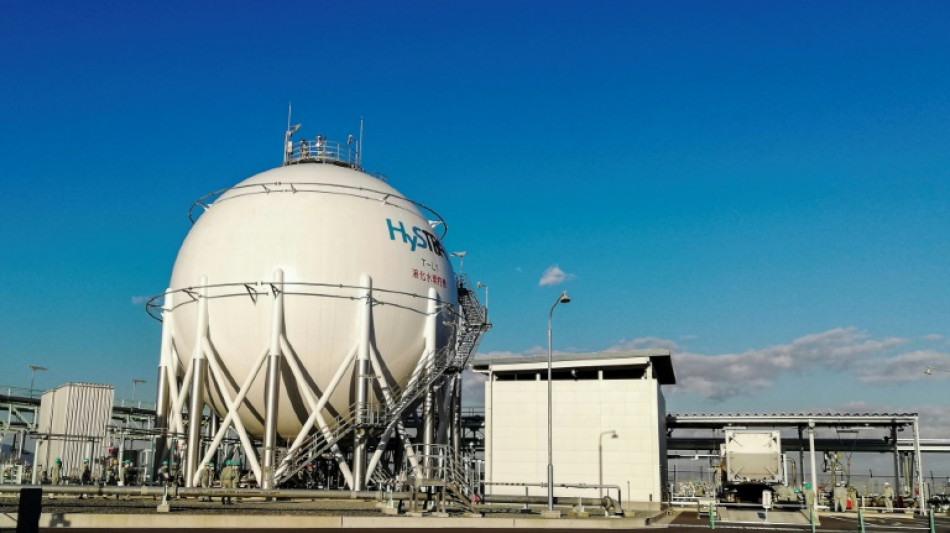
-
 German broadcaster recalls correspondent over AI-generated images
German broadcaster recalls correspondent over AI-generated images
-
US Supreme Court strikes down swath of Trump global tariffs

-
 England's Itoje says managing 'emotional turmoil' key to 100 cap landmark
England's Itoje says managing 'emotional turmoil' key to 100 cap landmark
-
Trump says weighing strike on Iran as Tehran says draft deal coming soon

-
 Tudor is '100 percent' certain of saving Spurs from relegation
Tudor is '100 percent' certain of saving Spurs from relegation
-
Azam dropped for scoring too slowly, says Pakistan coach Hesson

-
 Stocks volatile after soft US growth data, court ruling against tariffs
Stocks volatile after soft US growth data, court ruling against tariffs
-
Italy bring back Capuozzo for France Six Nations trip

-
 From Malinin's collapse to Liu's triumph: Top Olympic figure skating moments
From Malinin's collapse to Liu's triumph: Top Olympic figure skating moments
-
Arteta urges Arsenal to 'write own destiny' after title wobble

-
 Ukraine Paralympics team to boycott opening ceremony over Russian flag decision
Ukraine Paralympics team to boycott opening ceremony over Russian flag decision
-
Wales captain Lake wants fans to bring 'noise' against Scotland

-
 Skier Vonn's Italian hospital a hotbed of men, sister says
Skier Vonn's Italian hospital a hotbed of men, sister says
-
India target S.Africa top order, Abhishek to come good: bowling coach

-
 Carrick praises Man Utd 'diversity' after Ratcliffe's immigrant rant
Carrick praises Man Utd 'diversity' after Ratcliffe's immigrant rant
-
I never thought it would be hit, says 'Scream' creator 30 years later

-
 AI summit statement delayed to 'maximise' signatories: India
AI summit statement delayed to 'maximise' signatories: India
-
Barcelona's Sagrada Familia basilica hits peak height

-
 Milan sprints to second straight UAE stage win as Tiberi keeps lead
Milan sprints to second straight UAE stage win as Tiberi keeps lead
-
US GDP growth misses expectations as Trump blames shutdown
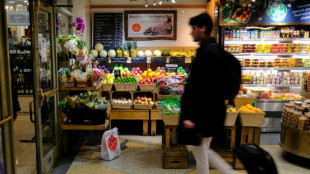
-
 Benfica investigate video of fans' monkey gestures
Benfica investigate video of fans' monkey gestures
-
French minister pledges tight security at rally for killed activist

-
 Guardiola 'couldn't care less' about Arsenal stumble in title race
Guardiola 'couldn't care less' about Arsenal stumble in title race
-
UK police search property as royals reel from Andrew's arrest
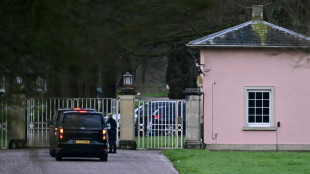
-
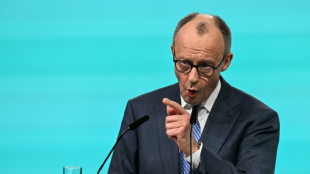 Germany's Merz to visit China next week
Germany's Merz to visit China next week
-
Kompany says Mourinho made 'huge mistake' in Vinicius racism row

-
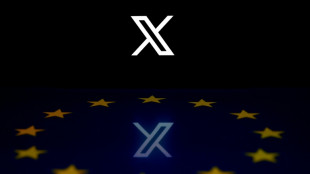 X appeals EU's 120-mn-euro fine over digital content violations
X appeals EU's 120-mn-euro fine over digital content violations
-
Galthie recalls hulking locks Flament, Meafou for Italy

-
 Turkey, Saudi sign major solar power deal
Turkey, Saudi sign major solar power deal
-
US Olympic freeskier Hess embraces 'loser' tag after Trump blast

-
 European stocks rebound, oil prices ease after US-Iran volatility
European stocks rebound, oil prices ease after US-Iran volatility
-
'Alpha male' AI world shuts out women: computing prof Hall

-
 New Zealand freestyle skier Ives in hard Olympic crash
New Zealand freestyle skier Ives in hard Olympic crash
-
New Zealand must adapt quickly to Sri Lanka wickets: Chapman

-
 Thai activist's jail term for royal insult extended to 30 years
Thai activist's jail term for royal insult extended to 30 years
-
Families of Duterte's drug war victims eye Hague hearing with hope

-
 India chases 'DeepSeek moment' with homegrown AI
India chases 'DeepSeek moment' with homegrown AI
-
UN touts panel for 'human control' of AI at global summit

-
 Ukraine Paralympics team to boycott Opening Ceremony over Russian flag decision: statement
Ukraine Paralympics team to boycott Opening Ceremony over Russian flag decision: statement
-
UK monarchy reels from Andrew's stunning arrest

-
 Somaliland, where Muslims love Israel
Somaliland, where Muslims love Israel
-
Florida airport to be renamed after US President Donald Trump

-
 Fans flock to Japan zoo to see viral baby monkey Punch
Fans flock to Japan zoo to see viral baby monkey Punch
-
Stocks mixed, oil rises after Trump Iran threat

-
 Outspoken Laos lawmaker's election exit sparks rare dissent
Outspoken Laos lawmaker's election exit sparks rare dissent
-
Kim Jong Un vows to boost living standards as he opens rare congress

-
 Shepherd hat-trick to Samra ton: Five top T20 World Cup performances so far
Shepherd hat-trick to Samra ton: Five top T20 World Cup performances so far
-
Zimbabwe surprise as T20 World Cup Super Eights begin without Australia

-
 Victorious Takaichi promises 'strong and prosperous' Japan
Victorious Takaichi promises 'strong and prosperous' Japan
-
Ex-South Korea leader apologises for martial law crisis


Japan-Australia flagship hydrogen project stumbles
Japan wants to become a hydrogen fuel leader to meet its net-zero goals, but one blockbuster project is hanging in the balance over questions about its climate credentials.
The Hydrogen Energy Supply Chain (HESC) is billed as a billion-dollar attempt to ship liquid hydrogen from Australia to Japan.
However, cold feet about the project in Australia means HESC will source hydrogen from Japan to meet a 2030 deadline for its demonstration phase.
Hydrogen sounds promising on paper: while fossil fuels emit planet-warming greenhouse gases, burning hydrogen creates only water vapour.
But it has not yet lived up to its promise, with several much-hyped projects globally struggling to overcome high costs and engineering challenges.
Hydrogen's climate credentials also depend on how it is produced.
"Green hydrogen" uses renewable energy, while "blue hydrogen" relies on fossil fuels such as coal and gas, with carbon-capture technology to reduce emissions.
"Brown hydrogen" is produced by fossil fuels without any carbon capture.
The HESC project aims to produce blue hydrogen in the Australian state of Victoria, harnessing abundant local supplies of lignite coal.
With the world's first liquid hydrogen tanker and an imposing storage site near Kobe in Japan, HESC had been touted as a flagship experiment showcasing Japan's ambitions for the fuel.
HESC says it aims to eventually produce enough hydrogen to "reduce about 1.8 million tonnes per annum of CO2 from being released into the atmosphere".
Japan's energy sector emitted 974 million tonnes of CO2 from fuel combustion in 2022, according to the International Energy Agency (IEA).
- 'Strong opposition' -
Japan's government pledged 220 billion yen (now $1.4 billion) to HESC's current "commercial demonstration" phase, which has a completion deadline of 2030.
But to meet this deadline, the project will now source hydrogen in Japan.
That has been blamed on cold feet among Australian officials concerned about the project's environmental payoff.
A spokesman for Japan's Kawasaki Heavy Industries, one of the companies behind HESC, said the decision to shift production to Japan was taken "chiefly because of delay in procedures on the Australian side".
The Victoria government did not respond to repeated requests for comment, though Australian officials have told local media that the move was a Japanese "commercial decision".
Australia's cooling interest in the project is due to "strong opposition" from environmental activists and energy experts opposed to carbon capture and storage, said Daisuke Akimoto of Tokyo University of Information Sciences.
"The main problem the project faces is the lack of approval of the blue hydrogen project by the Victorian government," Akimoto said.
Kawasaki said it has not yet decided what type of hydrogen it will procure in Japan and downplayed the project's challenges.
"We are very positive" about HESC and "there is no change" to the goal of building a new supply chain, the spokesman said, declining to be named.
- 'Evidence gap' -
However, sourcing the hydrogen locally leaves "a critical evidence gap at the middle of the project" -- proving carbon capture and storage work -- explained David Cebon, an engineering professor at the University of Cambridge.
That is "difficult and challenging and not being done successfully anywhere", Cebon said.
Kawasaki has said it will continue "feasibility studies" for the HESC project, but Cebon believes it will "quietly die", partly because of the cost of shipping hydrogen to Japan.
To be transported by sea as a liquid, hydrogen needs to be cooled to -253 degrees Celsius (-423.4 Fahrenheit) -- an expensive, energy-intensive process.
"I think wiser heads in the government just realised how crazy it is," said Mark Ogge from the Australia Institute think-tank.
Japanese energy company Kansai Electric has separately withdrawn from a different project to produce "green" hydrogen in Australia.
A company spokesman declined to comment on reports that the decision was due to ballooning costs.
- 'It will take decades' -
Resource-poor Japan is the world's fifth largest single-country emitter of carbon dioxide.
It already produces some hydrogen domestically, mostly using natural gas and oil or nuclear power, although this is limited and expensive.
Some experts are sanguine about HESC's challenges.
Noe van Hulst, a hydrogen advisor to the IEA, said it was important to take the long view.
"Pilot projects are undertaken to test innovations in practice: learning-by-doing," he told AFP.
"Yes, it is hard to develop a low-carbon hydrogen market and it will take decades," as with wind and solar energy, van Hulst said.
Solar in particular has seen costs plummet and uptake soar far beyond initial expectations and at greater speed.
And for now, "there isn't really an alternative (to) decarbonise these hard-to-electrify sectors like steel, cement, ships and planes", van Hulst added.
H.E.Young--AMWN

